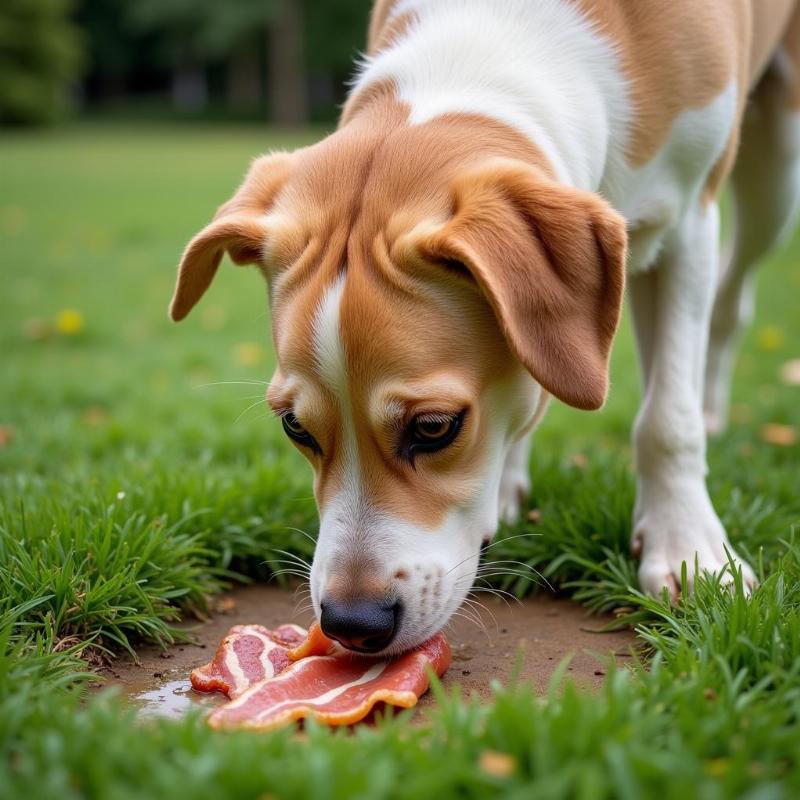Bacon, with its salty, savory aroma, is undeniably tempting, even for our canine companions. And what dog doesn’t love a good romp in the grass? But when it comes to combining these two—grass and bacon for dogs—we need to tread carefully. While a small amount of cooked bacon might not be immediately harmful, feeding your dog bacon regularly or letting them graze on grass where bacon grease has dripped can lead to several health issues. This article delves into the potential risks and benefits of grass and bacon for dogs, providing you with the information you need to make informed decisions about your furry friend’s diet and outdoor habits.
The Allure of Bacon: Why Dogs (and We!) Love It
Bacon is a popular breakfast food for humans, and its appealing smell and taste can be equally enticing for dogs. The high fat content contributes to its rich flavor, which is why many dogs find it irresistible. However, this very fat content is the primary reason why bacon is not recommended for dogs.
Can Dogs Eat Bacon? Examining the Risks
While a small, occasional piece of cooked bacon is unlikely to cause serious harm, regular bacon consumption can pose several risks to your dog’s health:
- Pancreatitis: The high fat content in bacon can trigger pancreatitis, a painful and potentially life-threatening inflammation of the pancreas.
- Obesity: Bacon is a calorie-dense food. Regular consumption can contribute to weight gain and obesity, leading to joint problems, heart disease, and other health issues.
- Sodium Toxicity: Bacon is very high in sodium. Excessive salt intake can lead to dehydration, vomiting, and even seizures in dogs.
- Gastrointestinal Upset: The richness of bacon can cause vomiting, diarrhea, and other digestive problems, especially in dogs with sensitive stomachs.
The Grass-Bacon Combo: A Recipe for Trouble
If you’ve ever enjoyed a bacon sandwich outdoors, you know how tempting it is for your dog to snatch any dropped bits. While a tiny crumb of bacon might not be harmful, bacon grease dripping onto the grass creates a different problem. The high fat and salt content can make the grass unpalatable and potentially irritate your dog’s stomach if ingested.
 Dog eating grass where bacon grease has dripped
Dog eating grass where bacon grease has dripped
Why Do Dogs Eat Grass?
While dogs are carnivores, they sometimes graze on grass. This behavior can have several explanations:
- Dietary Deficiencies: Some believe dogs eat grass to supplement their diet with missing nutrients.
- Upset Stomach: Grass can act as a natural emetic, helping dogs vomit and relieve an upset stomach.
- Boredom or Anxiety: Chewing on grass can be a self-soothing behavior for bored or anxious dogs.
Healthy Alternatives to Bacon for Dogs
If your dog enjoys the salty, savory flavor of bacon, there are healthier alternatives you can offer as occasional treats:
- Lean cooked chicken or turkey: These are excellent sources of protein and are lower in fat than bacon.
- Carrot sticks or apple slices: These crunchy treats provide vitamins and fiber.
- Dog-specific chews and treats: Look for options made with natural ingredients and appropriate for your dog’s size and age.
Is My Dog’s Grass-Eating a Cause for Concern?
Occasional grass-eating is usually not a cause for concern. However, if your dog is consistently eating large amounts of grass, or if it’s accompanied by other symptoms like vomiting, diarrhea, or loss of appetite, it’s essential to consult your veterinarian.
Conclusion: Prioritizing Your Dog’s Health Over Bacon Temptations
While the aroma of bacon might be irresistible to both you and your dog, it’s crucial to prioritize your furry friend’s health. Avoid feeding your dog bacon regularly, and be mindful of where bacon grease might drip outdoors. Opt for healthier treat alternatives and consult your veterinarian if you have any concerns about your dog’s diet or grass-eating habits. By making informed choices, you can help your dog live a long, healthy, and happy life.
FAQ
- Can a small piece of bacon kill a dog? A single small piece of cooked bacon is unlikely to be fatal, but it’s still not recommended due to the potential health risks.
- What should I do if my dog eats a lot of bacon? Monitor your dog closely for any signs of distress, such as vomiting or diarrhea. If your dog exhibits any unusual symptoms, contact your veterinarian immediately.
- Is all grass safe for dogs? Most types of grass are safe for dogs to graze on in moderation. However, avoid areas treated with pesticides or herbicides.
- What are some signs of pancreatitis in dogs? Signs of pancreatitis can include vomiting, diarrhea, loss of appetite, lethargy, abdominal pain, and fever.
- How can I prevent my dog from eating grass where bacon grease has dripped? Clean up any spilled bacon grease promptly and supervise your dog when they are outdoors in areas where bacon has been cooked or eaten.
- What are some healthy, low-fat treats I can give my dog? Lean cooked chicken or turkey, carrot sticks, apple slices, and dog-specific chews made with natural ingredients are good alternatives to bacon.
- How often should I take my dog to the vet for checkups? Annual checkups are recommended for most adult dogs, while puppies and senior dogs may require more frequent visits.
Beautdogs.us is your trusted source for comprehensive dog care information, breed insights, and product recommendations. We are dedicated to helping dog owners in the US provide the best possible care for their beloved companions. Whether you’re a new dog owner or a seasoned expert, Beautdogs.us offers valuable resources to enhance your dog’s well-being. Contact us today for personalized guidance! Email: [email protected], Phone: +1 501-555-7529. Visit Beautdogs.us for more expert advice.